Katharine Weber: The Memory of All That
August 19, 2011 by David
Filed under Non-Fiction, WritersCast
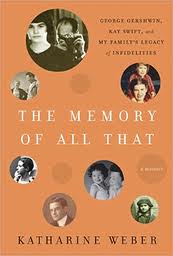 978-0307395887 – Crown – Hardcover – $24.00 – ebook editions also available
978-0307395887 – Crown – Hardcover – $24.00 – ebook editions also available
Katharine Weber is best known as a novelist – I interviewed her last year about her wonderful novel True Confections and she has written many more fine books. The Memory of All That, subtitled “George Gershwin, Kay Swift and My Family’s Legacy of Infidelities is both a memoir of her own family, as well as a history of a certain slice of twentieth century America, primarily focused on her grandmother, Kay Swift, whom she loved, and her quite unusual and difficult father, Sidney Kaufman, with whom her relationship was far more complicated to say the least.
Sidney Kaufman was a larger than life character, but mainly one of his own making, someone who spent years trying to “make it” in the movies and never succeeding. He was also a narcissist, a husband who literally neglected his wife and family, and who had numerous long lasting affairs. One most notable was an affair that lasted for years with Beatrice Buchman, wife of the famed (blacklisted) screenwriter, Sidney Buchman (who happens to be my father’s first cousin).
Sidney Kaufman also was a target of a decades long investigation by the FBI, initially because the agency confused him with another Sidney Kaufman, a longshoreman who joined the Abraham Lincoln Brigade to fight fascism in Spain. And hilariously, Kaufman was such a fantasist, that the FBI itself could not tell the facts about his life from the fiction. Not so hilariously was the effect of Kaufman’s absences and failures to relate to his family, which deeply affected the author of this book, as she recounts in some deeply moving passages in this book.
But in many ways, the focus of this book is really on Kay Swift, known even today for her wonderful music, as well as for her lengthy romance (and musical collaboration) with renowned composer George Gershwin. Weber tells her grandmother’s fascinating life story with a great deal of love, and of course intimacy, and provides an insider’s view of many details of her life and relationships with her husbands and lovers. Swift is in many ways an iconic, 20th century American woman, who made her way among men at a time when doing so was unusual and difficult, and required considerable verve and inner direction. And while she had many material advantages, the challenges she faced and overcame, both personally and professionally, were significant and testament to her powerful inner being.
Weber’s grandfather was James Paul Warburg, and here introduces us to him and the rest of his famous banking family. Interesting stories are here in abundance. Grandfather Warburg advised and feuded with President Franklin D. Roosevelt, great-uncle Aby Warburg, while eccentric to say the least, was responsible for significant theories in art and myth, and the family was at times dominated by the unusual psychoanalyst Gregory Zilboorg (who slept with his patients on a regular basis, and turned George Gershwin against Kay Swift when she decided to stop allowing him to sleep with her!)
Overall, this is an engaging, beautifully written and emotionally powerful book. Katharine Weber’s family has been complicated, brilliant, interesting, and influential in many areas of American life, and of course has made her the writer she is today. She tells the story of her family with humor, love and a keen eye for emotional detail, and gives us a portrait of herself at the same time.
In my conversation with Katharine we talked about her father, and the complexities of his life, as well as her relationship with Kay Swift and how this book came to be written. It’s a terrifically engaging story she has to tell and we had a great talk about her really great book.
Katharine Weber’s website is here. The Memory of All That got a terrific review in the NY Times:
“…Ms. Weber’s account of her relationship with her manipulative fabulist of a father brings to mind classic autobiographies of unmoored childhoods, like Mary Karr’s “Liars’ Club” and those companion volumes from the brothers Wolff, “This Boy’s Life” (Tobias) and “The Duke of Deception” (Geoffrey)…It’s when Ms. Weber remembers Papa that her considerable skills as a writer are most seductively on display. And it’s not just because the exasperating Kaufman is such a good subject. It’s that Ms. Weber is able to arrange words musically, so that they capture the elusive, unfinished melodies that haunt our memories of childhood. As her grandmother’s lover might have put it, she’s got rhythm.” – Ben Brantley
Podcast: Play in new window | Download
Publishing Talks: David Wilk Interviews Peter Costanzo
August 14, 2011 by David
Filed under Ebooks and Digital Publishing, PublishingTalks, Technology, The Future
 In this ongoing series of interviews, called Publishing Talks, I have been talking to book industry professionals and other smart people about the future of publishing, books, and culture. This is a period of disruption and change for all media businesses. We must wonder now, how will publishing evolve as our culture is affected by technology, climate change, population density, and the ebb and flow of civilization and economics?
In this ongoing series of interviews, called Publishing Talks, I have been talking to book industry professionals and other smart people about the future of publishing, books, and culture. This is a period of disruption and change for all media businesses. We must wonder now, how will publishing evolve as our culture is affected by technology, climate change, population density, and the ebb and flow of civilization and economics?
I believe that these Publishing Talks conversations can help us understand the outlines of what is happening in the publishing industry, and how we might ourselves interact with and influence the future of publishing as it unfolds.
These interviews give people in and around the book business a chance to talk openly and broadly about ideas and concerns that are often only talked about “around the water cooler,” at industry conventions and events, and in emails between friends. These conversations give people inside and outside the book industry a chance to hear first hand some of the most interesting and challenging thoughts, ideas and concepts being discussed by active participants in the book business.
I’ve known Peter Costanzo for a number of years (and have worked with him on a few projects) – I have always been impressed with his intelligence and his insightful understanding of online media and digital publishing. Peter is now the Director of Digital Content for F+W Media where he is in charge of a diverse and creative set of digital initiatives. Since he is now directing content and production for a publisher that has made a deep commitment to digital publishing, I wanted to talk to him in depth about ebooks, apps and online marketing, from his perspective as a producer as well as a consumer and keen observer of the digital publishing scene.
Peter has been involved in online bookselling for longer than most people in our industry. He began selling autographed books online in 1996. By 1998 he became the Online Retail Marketing Manager for HarperCollins. He then worked at Random House as Online Marketing Manager for the Audiobooks division, and in 2001 became Director of Online Merchandising for Steve Brill’s Contentville, one of the first online retailers to sell e-books. After that he became the Director of Online Marketing for Perseus Books for several years, before moving to F + W Media. He also teaches the “Introduction to Interactive Media” course at NYU. You can follow Peter on Twitter @PeterCostanzo and read his personal blog BookCurrents.
Peter has a lot of important things to say in this discussion that anyone interested in digital publishing will find useful and compelling.
Podcast: Play in new window | Download
Scott Gummer: Parents Behaving Badly
July 31, 2011 by David
Filed under Fiction, WritersCast
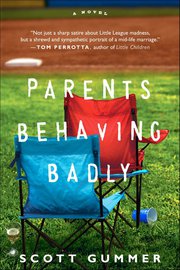 978-1451609172 – Simon & Schuster Touchstone – hardcover – $23.00 (ebook versions available)
978-1451609172 – Simon & Schuster Touchstone – hardcover – $23.00 (ebook versions available)
Scott Gummer’s Parents Behaving Badly appealed to me right away – a novel about Little League, what more fun could you want? Baseball is one of my greatest passions and having been a Little League parent and coach, I was looking forward to reading a novel set in this rich environment that so full of potential for conflict and frustration, as well as great joy.
In any kid sports environment, you have parents’ overwrought desires and expectations, the fraught interactions of coaches and parents, and the difference in outlook between any given 10 year old and any parent is especially fertile ground. And don’t forget the potential for unexpected romance among the suburban parental set.
Reading Parents Behaving Badly, which is, by the way, laugh out loud funny, did not disappoint in any way. Gummer is funny and extremely perceptive, and what really makes the novel work is that he tells a good story, writes believable characters, explores their inner lives, and keeps us guessing about what will happen next.
And there’s more here than Little League, fun and sometimes as painful as that particular piece of Americana can be. His main character is back in the hometown he grew up in, along with his wife, and they’ve been married long enough for them to know each other all too well. Gummer is very sharp in his depiction of the mid-life married life of modern American suburban couples, especially the challenges they face as their lives become focused on their children at the risk of losing sight of themselves and their relationships. He uses Little League, small town life, pop culture and thwarted desires as fodder for a wonderful story that ultimately ends better than one might have imagined.
Tom Perrotta gave a great blurb to author Gummer for this book: “Parents Behaving Badly isn’t just a sharp satire about Little League madness; it’s also a shrewd and sympathetic portrait of a mid-life marriage. Scott Gummer writes with equal insight about wayward spouses and conniving coaches.” Perrotta is among my favorites of contemporary novelists, and I’m happy to say that if you like his work, you will love Parents Behaving Badly, which while in no way derivative, is certainly in the same vein as Perrotta’s novels.
Scott gives a great interview, doubtless because of his years of experience as a working journalist. He knows how to talk about his work and to present his story vividly without giving too much away. I recommend his website as well. He’s also written a couple of very interesting nonfiction books about golf (this is his first published novel).
Podcast: Play in new window | Download
Nick Mamatas: Sensation
July 21, 2011 by David
Filed under Fiction, WritersCast
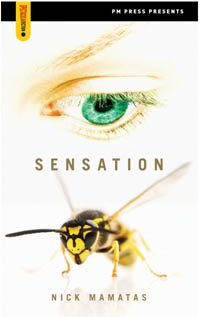 978-1604863543 – PM Press – paperback – $14.95 (e-book editions available)
978-1604863543 – PM Press – paperback – $14.95 (e-book editions available)
“When Julia Hernandez leaves her husband, shoots a real estate developer, and then vanishes without a trace, she slips out of the world she knew and into the Simulacrum—a place where human history is both guided and thwarted by the conflict between a species of anarchist wasps and a collective of hyperintelligent spiders. When Julia’s ex-husband Raymond spots her in a grocery store he doesn’t usually patronize, he’s soon drawn into an underworld of radical political gestures where Julia is the new media sensation of both this world and the Simulacrum.”
Nick Mamatas is an incredibly inventive writer. Sensation combines comedy, inter-species communication, fantastic imagination, social and political critique into a fast moving, tightly plotted and very unusual storyline. By combining a science fiction bent with a hyper-real portrayal of modern digitally connected culture, Mamatas is able to play with all the elements of modern everyday life, so we see things differently, perhaps even more clearly.
In some ways like The Matrix, there is an invisible world around and behind our own. Fittingly, in Sensation, that world is essentially woven by a species of spiders that has created an very special relationship with the human world, one that is far from predictable and complicated in its own right. These spiders care about humans, protect them, and use them for their own purposes in an ongoing war with a parasitic species of wasps. On this unlikely and unusual premise, Mamatas has built a fantastic story.
I enjoyed reading this book on a number of levels, not the least of which for the author’s simultaneously dark, comedic and critical approach to our modern digital, paranoid, corporatized and controlled society. I do like it when a novelist can successfully include political critique in a work of fiction. Mamatas is an accomplished writer with a dystopian outlook I enjoy. And similarly I enjoyed our conversation about this book and the author’s approach to writing. I think you will appreciate his approach to talking about his work.
“Nick Mamatas continues his reign as the sharpest, funniest, most insightful and political purveyor of post-pulp pleasures going. He is the People’s Commissar of Awesome.” — China Mieville, award-winning author of Kraken and The City and the City
Nick’s website is well worth a visit as well as his online journal (Nihilistic Kid).
Podcast: Play in new window | Download
Publishing Talks: David Wilk interviews Kate Wilson
July 11, 2011 by David
Filed under Ebooks and Digital Publishing, PublishingTalks, The Future
 In this ongoing series of interviews, called Publishing Talks, I have been talking to book industry professionals and other smart people about the future of publishing, books, and culture. This is a period of disruption and change for all media businesses. We must wonder now, how will publishing evolve as our culture is affected by technology, climate change, population density, and the ebb and flow of civilization and economics?
In this ongoing series of interviews, called Publishing Talks, I have been talking to book industry professionals and other smart people about the future of publishing, books, and culture. This is a period of disruption and change for all media businesses. We must wonder now, how will publishing evolve as our culture is affected by technology, climate change, population density, and the ebb and flow of civilization and economics?
I believe that these Publishing Talks conversations can help us understand the outlines of what is happening in the publishing industry, and how we might ourselves interact with and influence the future of publishing as it unfolds.
These interviews give people in and around the book business a chance to talk openly about ideas and concerns that are often only talked about “around the water cooler,” at industry conventions and events, and in emails between friends and they give people inside and outside the book industry a chance to hear first hand some of the most interesting and challenging thoughts, ideas and concepts being discussed by people in the book business.
I was recently introduced to the apps and books created by the new UK based children’s publisher Nosy Crow. I bought their first app, the Three Little Pigs and immediately understood that this company had a vision and an approach that made sense to me. Here is the message from their website that caught my attention right way:
“We make innovative, multimedia, highly interactive apps for tablets, smart phones and other touchscreen devices. These apps are not existing books squashed onto phones, but instead are specially created to take advantage of the devices to tell stories and provide information to children in new and engaging ways.” Books too by the way.
When I finally got a chance to talk to company founder Kate Wilson, I found out right away why the company is so smart, and off to such a great start. I believe that Kate deeply understands how technology and publishing can and will intersect for the creation of great experiences for children readers. She has a vision, one that makes sense, and she has combined creativity with a keen sense of what parents and children want both from new technologies and from traditional books. And her experience in publishing has taught her important lessons which she is now applying in this new publishing space (after attending Oxford University, she worked for a number of UK children’s publishers, including Macmillan Children’s and Scholastic UK, both of which she ran. If you are interested in how children’s publishing is going to evolve, I suggest paying close attention to Nosy Crow, and of course listening to this conversation with Kate Wilson.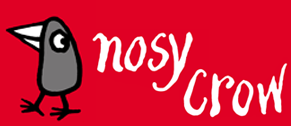
Podcast: Play in new window | Download
Anna Lappe: Diet for a Hot Planet
July 2, 2011 by David
Filed under Non-Fiction, WritersCast
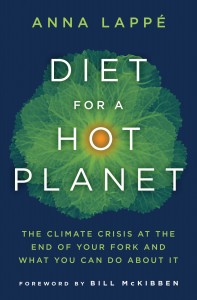 978-1-60819-465-0 – Bloomsbury – Paperback – $15.00 (ebook editions available)
978-1-60819-465-0 – Bloomsbury – Paperback – $15.00 (ebook editions available)
Anna Lappe´ is the daughter of the well-known activist and writer Frances Moore Lappe´, author of the classic Diet for a Small Planet, a book that introduced Americans to the idea of thinking about food and its role in ecology and the world economy, and how food is so deeply intertwined with economics and politics. Anna has therefore been involved in food issues since she was a child. She and her mother collaborated on another interesting and challenging book, Hope’s Edge in 2002. So it’s not a surprise that she is so thoroughly cogent and coherent writing and talking about food issues in the context of climate change.
As Anna says on one of her many website, takeabite.cc, “the food system is responsible for as much as one-third of all greenhouse gas emissions. These emissions are particularly alarming because the food sector is the biggest driver behind methane and nitrous oxide emissions, which have global warming effects many times more powerful than carbon dioxide.” In Diet for a Hot Planet, Lappe´ goes straight to the heart of the issue: if we are going to think about the global climate crisis, we have to think about our food system, and if we are going to make change to mitigate the effects of climate change, we must make changes (now) in the global industrialized food system that dominates most of the world today.
This book was extensively and deeply researched; Lappe´ talked to many scientists, went to UN, governmental, corporate, and grassroots agriculture conferences, worked her way through many lengthy and dense reports and studies, and also visited organic farms around the world.
In this book she has put together an impressive array of facts proving that global industrial agriculture—specifically the use of hazardous chemicals, concentrated animal feeding operations, biotech crops, and processed foods—is impoverishing the land, destroying rain forests, polluting waterways, and emitting nearly a third of the greenhouse gases that are heating the planet.
By contrast, intelligently designed and operated organic-farming methods reduce carbon emissions and toxic waste while at the same time nurture soil and biodiversity. Lappe´is convinced (and will likely convince you) that eating according to ecologically appropriate principles can not only influence the marketplace and help combat world hunger and climate change, but will make us healthier and safer as well. Lappé also decodes food labeling, exposes Big Ag’s “greenwashing” tactics, and offers “seven principles of a climate-friendly diet.”
With a terrific foreword by the brilliant Bill McKibben, Diet for a Hot Planet should be essential reading for anyone who is trying to grapple with making real change in the way we live on this fragile planet. Anna is a terrific public speaker and our talk for WritersCast is lively, full of information, and optimistic and positive as Anna herself.
Anna Lappe´related organizations and websites should be on your bookmark list:
Take a Bite Out of Climate Change
Podcast: Play in new window | Download
Slowing Down for the Summer
 I have been posting two podcasts a week for the better part of the last year, which has been great fun. But with the summer in full swing, weather wonderful and plenty of work in the hopper, it looks like I may be posting slightly less frequently for the next couple of months. I’m not reading fewer books, but scheduling interviews seems to be more difficult in the summer too. And publishers and technologists take vacations! I do have some really good interviews coming along soon: Anna Lappe, Nick Mamatas, Dean Bakopoulos among other writers, and Kate Wilson of the great new kids publisher Nosy Crow for Publishing Talks. And there will be more.
I have been posting two podcasts a week for the better part of the last year, which has been great fun. But with the summer in full swing, weather wonderful and plenty of work in the hopper, it looks like I may be posting slightly less frequently for the next couple of months. I’m not reading fewer books, but scheduling interviews seems to be more difficult in the summer too. And publishers and technologists take vacations! I do have some really good interviews coming along soon: Anna Lappe, Nick Mamatas, Dean Bakopoulos among other writers, and Kate Wilson of the great new kids publisher Nosy Crow for Publishing Talks. And there will be more.
I’ve also started a new website I hope you will visit – it’s called New Book Media (newbookmedia.com) featuring a long list of digital book events around the world, and a steady stream of news and information about the wildly expanding world of digital publishing. Livewriters.com now has more than 2500 book and author related videos, and is still the only website focused exclusively on video about books, along with an entertaining and original literary blog called LiveWires.
If you’ve read a great book lately I want to know about it. Direct message your recommendations to @writerscast.
Caroline Leavitt: Pictures of You
June 22, 2011 by David
Filed under Fiction, WritersCast
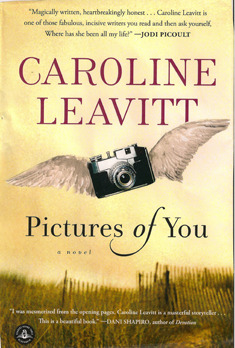 978-1565126312 – Algonquin Books – $13.95 – paperback original (ebook versions also available)
978-1565126312 – Algonquin Books – $13.95 – paperback original (ebook versions also available)
I’ve become a big fan of Caroline Leavitt’s work – I read Girls in Trouble last year and interviewed this very entertaining and engaging author about that book for WritersCast in 2010 (listen to that interview here).
Pictures of You starts with a car crash, and some of the unanswered questions about how and why it happened, inexorably and permanently linking the lives of two families. These complicated relationships are at the core of the novel. There are many threads to unravel in this story, and it was for me a completely compelling book to read. The two women involved in the crash, Isabelle and April, were both fleeing their lives at the time; the crash stops time for both of them, one literally, the other figuratively and psychologically.
Isabelle is the woman who survives the crash; her connection to the other woman, April, who does not, and April’s family (who lived only six blocks away from her when the crash occured), is what drives the novel forward. There’s a great deal of pain and suffering in this novel, but it is never overwhelming, we are drawn to these characters and recognize the choices they make, and sympathize with their difficulties throughout, the imperfections of human beings we fully recognize in our own lives.
This is a complex story about the nature of family, how we depend on others and how they let us down in small and large ways, and how people are able to recreate their lives, sometimes painfully, when those lives have been broken. Carolyn See wrote a wonderful review of the novel for the Washington Post that ends with this wonderful description: “This is a novel that invites us to look at our own imperfections, not the dramatic crimes, but the niggling little sins of omission that so often render our lives tragically undernourished and small.”
If you have not discovered the work of Caroline Leavitt (she’s a busy writer, the author of ten novels, writes criticism for the Boston Globe and People, teaches novel writing for UCLA online, and judges fiction awards too), Pictures of You would be a great book to start with. It’s complex and rewarding, and deeply humane.
Caroline blogs at CarolineLeavittville.com and has a fun website as well (Welcome to Leavitt Town…)
Podcast: Play in new window | Download
Publishing Talks: David Wilk Interviews Frank Rose
June 13, 2011 by David
Filed under Ebooks and Digital Publishing, PublishingTalks, The Future
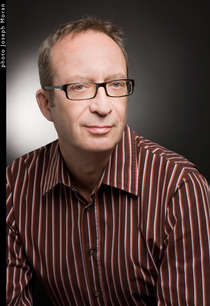 In this series of interviews, called Publishing Talks, I have been talking to book industry professionals and other smart people about the future of publishing, books, and culture. This is a period of disruption and change for all media businesses. We must wonder now, how will publishing evolve as our culture is affected by technology, climate change, population density, and the ebb and flow of civilization and economics?
In this series of interviews, called Publishing Talks, I have been talking to book industry professionals and other smart people about the future of publishing, books, and culture. This is a period of disruption and change for all media businesses. We must wonder now, how will publishing evolve as our culture is affected by technology, climate change, population density, and the ebb and flow of civilization and economics?
I hope these Publishing Talks conversations can help us understand the outlines of what is happening in the publishing industry, and how we might ourselves interact with and influence the future of publishing as it unfolds.
These interviews give people in and around the book business a chance to talk openly about ideas and concerns that are often only talked about “around the water cooler,” at industry conventions and events, and in emails between friends and they give people inside and outside the book industry a chance to hear first hand some of the most interesting and challenging thoughts, ideas and concepts being discussed by people in the book business.
Frank Rose is a journalist and author, most recently of a book called The Art of Immersion, How the Digital Generation Is Remaking Hollywood, Madison Avenue, and the Way We Tell Stories. I could easily have interviewed him about that book, which is interesting enough in its own right (and later this year I plan to talk to him about it for WritersCast).
But for this conversation, I wanted to talk to Frank about how writers are adapting to the changes wrought in publishing by the advent of digital books.
Frank has recently reprinted another one of his books, one that has been out of print for a number of years; it fits the profile of a fine book from the recent past that cannot be published or re-published commercially anymore. That book is called West of Eden: The End of Innocence at Apple Computer. It’s about the power struggle at Apple that ended up with Steve Jobs being pushed out of the company he had helped found. West of Eden was originally published in 1989 at which time it was a national best-seller and was rated as one of the ten best business books of the year by BusinessWeek.
In 2009, Frank published an updated version of the book himself for Amazon’s Kindle, as well as a digitally printed paperback edition under his own press name (Stuyvesant Street Press) and the book has been doing quite decently. One assumes that there are a fairly large number of people today who are interested in and knowledgeable about the history of modern computing and the computer industry. Enough for an author, if not for a commercial publisher to make a reasonable profit from publishing this book digitally.
Currently Frank writes for Wired, where he has been a contributing editor for almost ten years. Before this assignment, he was a contributing writer at Fortune, writing about Hollywood and global media conglomerates, he’s also been at Esquire, Premiere and Travel + Leisure, and has written for the New York Times Magazine among many other magazines. And he began his writing career at the Village Voice covering the emerging punk scene in Lower Manhattan in the ’70s.
Chances are good that Frank Rose’s experience as an author turned publisher will be reflective of a myriad of similar authors in the next few years. And perhaps will indicate some interesting opportunities for other segments within the publishing ecosystem.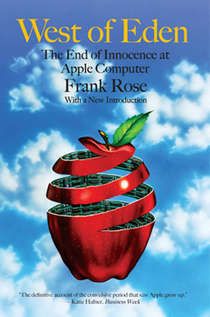 I think this conversation will be interesting to many in the book business who are thinking about how roles are changing in publishing, especially as digital publishing creates so many new opportunities for easy distribution to readers.
I think this conversation will be interesting to many in the book business who are thinking about how roles are changing in publishing, especially as digital publishing creates so many new opportunities for easy distribution to readers.
More on Frank Rose here. More on West of Eden at Amazon.
Podcast: Play in new window | Download
Nina Sankovitch: Tolstoy and the Purple Chair
June 5, 2011 by David
Filed under Non-Fiction, WritersCast
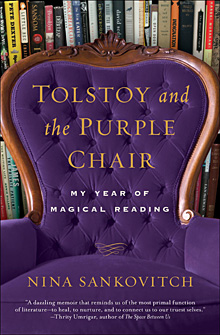 978-0061999840 – Harper – $23.99 – Hardcover (ebook version also available)
978-0061999840 – Harper – $23.99 – Hardcover (ebook version also available)
This is truly a wonderful book by an exceptional writer. Nina Sankovitch was living a full, active life as an environmental lawyer, happily married with four children, when her beloved sister became ill with cancer and died far too young. As she recounts in Tolstoy and the Purple Chair: My Year of Magical Reading, her initial response to her sister’s death was to “live her life double,” doing everything she could to try to make up for her terrible and painful loss. After three frantic years she realized what she was doing was unsustainable.
Ironically, her apparent retreat from doing to experiencing through reading was in some ways no less radical. Nina committed to reading a book a day for an entire year, no small commitment in itself, but further, she committed herself to writing a review or think piece about every book she read. That is a very high bar to set for any modern parent, even with a patient and understanding family (when I started Writerscast, I committed myself to read at least one book each week and to interview its author, a far lesser commitment, and after two years of doing it, I know how difficult, even impossible it would be for me to read a book a day, for a short period of time, much less a full year).
But Nina turned to reading because reading has always been central to her life and experience. Her immigrant parents read and loved books, as did Nina, from an early age. In Tolstoy and the Purple Chair, Nina tells the story of both her families, the vibrant one she grew up in, and the supportive and happy one she has raised. Many of the books she read in her magical year of reading are discussed here, as the stories of these books are part of the weave of how she transformed her experience of death into a celebration of life. And that is the crux of this memoir. By leaving her own experience to enter the realms of literally hundreds of writers, and making a place for those other stories in her own life, Nina was able to recreate and restore her own psyche – that’s the magic, the alchemy, of her magical year.
I should mention that Nina lives near me and has become a valued friend, partly through books we’ve read and discussed, including a couple I gave her to read and which are included in her year of reading. During that year she started an excellent blog called Read All Day where you can find all of her well written and exceptionally perceptive book reviews and essays.
Podcast: Play in new window | Download


